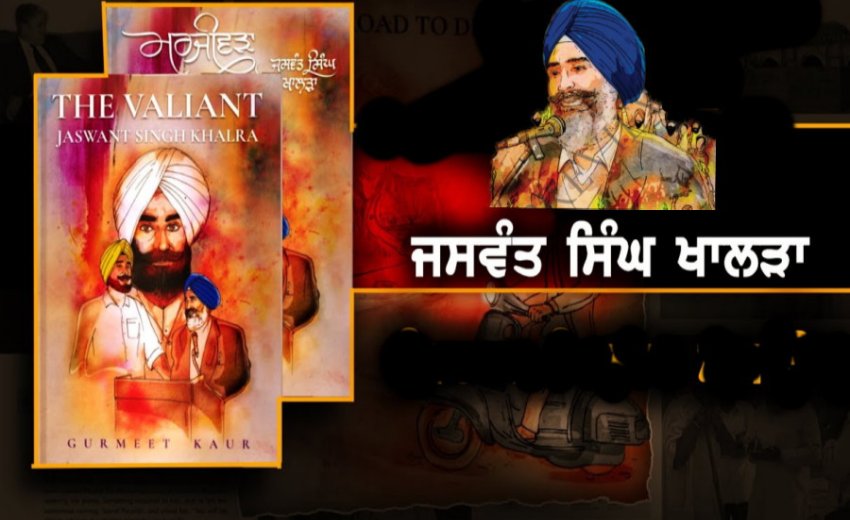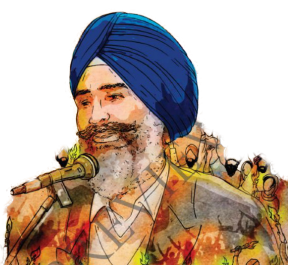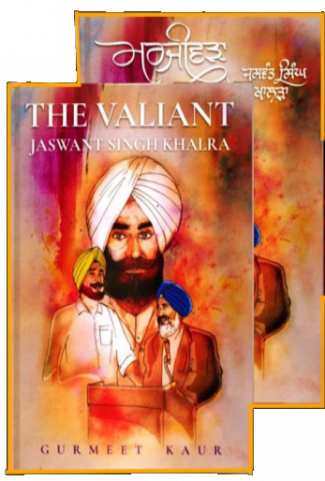“A Single Garment of Destiny:
A Review of The Valiant: Jaswant Singh Khalra”
Nicole Ranganath, Ph.D. University of California, Davis
Every American should know the name of human rights activist Jaswant Singh Khalra and the cause for which he gave his life. In April 1995, Khalra traveled from Punjab, India to Canada to gather international support against widespread human rights abuses in India. He presented compelling evidence that he had meticulously gathered of the thousands of Sikhs who had been unlawfully murdered by Indian state authorities during the civil war in Punjab in the eighties and nineties. Khalra had discovered crematoria records documenting the identities of over 25,000 people who were secretly killed by the Punjab police (https://ensaaf.org/blog/map-thekillings- and-disappearances). Despite the danger, he worked relentlessly to make his findings public in India and abroad. His final speech in Canada was delivered with serene detachment; he knew the fate that likely awaited him in India. On September 6, 1995, not long after he returned home, Jaswant Singh Khalra disappeared. His body was never recovered. Years of investigation uncovered what many suspected, Khalra was likely abducted, tortured, and murdered by the police. He was 42 years old, leaving behind a wife and two small children.
In his final international speech, Khalra told a Punjabi fable illustrating the power of one Lamp to defy Darkness. In the midst of enveloping darkness and fear, one Lamp far away proclaimed, “I challenge the Darkness. If nothing else, then at least around myself, I will not let it settle. Around myself, I will establish Light.” (Khalra, “Defiance of Darkness” Speech, https://www.youtube.com/watch?v=6wGpWd9UUAQ). He inspired many Sikhs to become the light that defends the rights of humanity, and in Punjab, boldly defies state-sanctioned violence. “It’s always the Sikhs,” Khalra’s daughter recalled her father saying, “who fight against injustice… [to protect anyone who is attacked].” “As a Sikh, it is our responsibility to stand up against oppression” (Interview with Navkiran Khalra by Nicole Ranganath, December 20, 2017).
Khalra’s mission and untimely murder resemble another international human rights figure – Dr. Martin Luther King Jr. Both pursued justice through legal, non-violent methods to close the gap between the promise of the Constitution and the abuses of state power against minorities. Even their final speeches are similar in tone and message. Amidst a brutal garbage workers’ strike in Memphis, Tennessee in the spring of 1968, Dr. King praised the black community’s unity after a 16-year old black boy was killed by police: “You are demonstrating that we are all tied in a single garment of destiny, and that if one black person suffers, if one black person is down, we are all down” (King, March 18, 1968). Like Khalra, he emphasized how we all bound together in the fight for justice for humanity. Dr. King also foresaw his imminent death: “Like anybody, I would like to live a long life—longevity has its place. But I’m not concerned about that now … I’ve seen the Promised Land. I may not get there with you. But I want you to know tonight that we, as a people, will get to the Promised Land” (King, “I’ve Been to the Mountaintop” Speech, https://www.youtube.com/watch?v=zgVrlx68v-0). The next day Dr. King was assassinated at a Memphis hotel by a white supremacist. He was 39 years old, leaving behind a wife and four small children.
Gurmeet Kaur’s new book, The Valiant: Jaswant Singh Khalra is a biography for young readers. The author is a gifted storyteller who shares the contours of Khalra’s life in a beautifully illustrated book with engaging prose. One of the book’s strengths is the author’s placing Khalra’s biography within the historical context of the Sikh community’s ongoing struggles for preserving their faith and identity. Khalra’s grandfather, Harnam Singh, was active in the ghadar (revolutionary) movement of oversees South Asians that aimed to overthrow the British in India in the early 1900s. After returning to Punjab, Harnam Singh was forced to live his remaining years in Shanghai to avoid imprisonment in India. After he passed away, his body was never returned to his family to perform the last rites. When I interviewed Navkiran Khalra (Jaswant Singh Khalra’s daughter) for a documentary about Punjabi American women, I asked her about how her grandfather felt losing both his father and his son, one to liberate India and the other to curb its abuses of power: “My grandfather had no regret that his father sacrificed his life for a country that at the end took his son’s life,” she replied stoically.
The book charts the history of the complicated, shifting position of Sikhs in relation to the Indian state across the twentieth century. It is the author’s gift as a storyteller that she humanizes Sikh history within the prism of the personal sacrifices borne by one family. The Khalra family’s commitment to fighting oppression led Harman Singh to dedicate his life to liberating India from British rule. He could have never imagined that his grandson would sacrifice his life for opposing the independent Indian state nearly a century later.
Jaswant Singh Khalra’s courageous work, and the human rights abuses in India in the eighties and nineties, should be known to the American public. I recommend this book to young Americans who are deeply interested in the issues of social justice, human rights, and state-sanctioned violence. I advocate integrating The Valiant into social studies, history, and social justice curricula in American secondary schools. Gurmeet Kaur creates a beautifully engaging book honoring Khalra’s legacy that brings the human dimensions of this important history to life for young adults all over the world. After all, learning the lessons of one Lamp far away can help illuminate the darkness closer to home.
____________________________________________________
About the Reviewer
Nicole Ranganath is an Assistant Professor who specializes in the history of the Sikh diaspora in the Middle East/South Asia Studies at the University of California, Davis. She has documented the history of Sikhs in California and Fiji in scholarly articles, in the UC Davis Pioneering Punjabis Digital Archive, and in a documentary about women in California’s Punjabi community, “Jutti Kasoori (Walking into the Unknown).” Visit: https://pioneeringpunjabis.ucdavis.edu/
________________________
Book Details
Ages 12+
Hardbound 7” x 10”,
225 pages Full color illustrations
Punjabi & English editions
www.pippal.org



